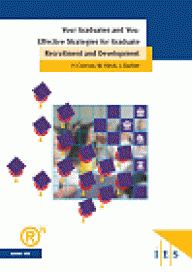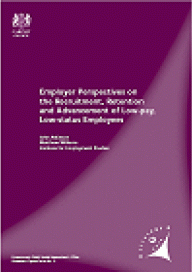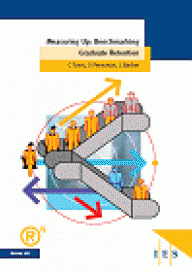Publications
 We author and publish a range of resources to keep you up to date with the latest developments in employment, labour market and human resource policy and practice.
We author and publish a range of resources to keep you up to date with the latest developments in employment, labour market and human resource policy and practice.
All our pdf publications are free to access.
Search results
-

Asian EMERGENCE: The World's Back Office?
Huws U, Flecker J (eds) | Mar 2004 | Institute for Employment StudiesThe rapid development of eWork in Asia was, by the mid 2000s, leading to an equally rapid growth of a new professional and technical middle class in the Asian cities and regions where this development was taking place. This was driving a general development process, accompanied by an equally explosive growth in markets. This study drew on 59 in-depth case studies of eWork relocation, exploring the trends and implications for managers, workers and policy makers. It built on earlier work by the EC-sponsored EMERGENCE project carried out on 2000-2001.
-

Next Choices: Career Choices Beyond University
Pollard E, Pearson R, Willison R | Jan 2004 | Institute for Employment StudiesThe third in IES' 'Choices' series, this study followed a cohort of 1998 university/college of higher education applicants. In 1998, 'Making the Right Choice' explored information, advice and choices about HE. In 2000, 'Right Choice'? looked at the outcomes of individuals' choices in terms of the HE experience. This study continues to map choices and how they evolve over time.
-

e-Recruitment: Is it Delivering?
Kerrin M, Kettley P | Oct 2003 | Institute for Employment StudiesThis report provides survey and detailed case study evidence of the experiences of organisations in implementing e-recruitment. It also illustrates perceived benefits, and evidence of barriers to implementation. A key message for recruiters is to acknowledge that the adoption of e-recruitment is about more than technology. Most significantly, e-recruitment is to do with cultural and behavioural change, both within HR and amongst line managers. For e-recruitment to deliver, it is about developing the capability of HR to facilitate the system, and to view the staffing process as an end-to-end process, similar to that of a supply chain.
-

Your Graduates and You
Effective Strategies for Graduate Recruitment and Development
Connor H, Hirsh W, Barber L | Sep 2003 | Institute for Employment StudiesThis research examines how employers' graduate strategies are changing in the light of recent business, labour market and other changes. It identifies three main drivers of a good strategy: clarity of strategic intention for recruiting graduates; appropriate internal organisational arrangements, in particular the degree to which there needs to be corporate involvement; and providing varying amounts of planned, structured development to meet different business and graduate needs.
-
📄
Workforce Planning: The Wider Context
A literature review
Sinclair A, Robinson D | Jul 2003 | Employers' Organisation for Local GovernmentThis review was part of the Employers' Organisation for local government project to support local authorities through the Comprehensive Performance Assessment. The main purpose of the report was to summarise research and literature primarily outside local government. Academic literature, practitioner literature and case studies were drawn upon to illustrate the context of workforce planning: its history, who uses it and why.
-
📄
The Making of a Cybertariat
Virtual Work in a Real World
Huws U | Jul 2003 | Monthly Review PressThe workplace has been changed in recent decades by the rise of digital technologies. Parts of a single labour process can be moved around the world, with implications not only for individual workplaces or firms, but for the working class as a whole. Huws' Making of a Cybertariat examines this process from a number of perspectives. It focuses especially on women in the workplace and at home. It examines changing categories of employment, and modes of organisation.
-
📄
Ready, SET Go: A Review of SET Study and Career Choices
Pollard E, Jagger N, Perryman S, Van Gent M, Mann K | Jun 2003 | Engineering Technology BoardGuided by its expert advisory Education Panel, the Engineering Technology Board and its research partners have addressed concerns over the declining number of students pursuing a career in science, engineering and technology (SET) and identifying the points at which talented individuals are deterred from starting or continuing down that path. This report by IES explores the role of career services in making SET more appealing, especially to women. This publication is no longer available.
-

Employer Perspectives on the Recruitment, Retention and Advancement of Low-pay, Low-status Employees
Atkinson J, Williams M | Jun 2003 | Cabinet OfficeLow skill, low status jobs in the UK can constitute a first step on a ladder to rising lifetime earnings, in which experience, tacit skills, contacts and know-how can be acquired and used to promote a pay off later. However, in practice, they provide little or no basis for substantial advancement through the labour market: the evidence suggests that short-term mobility in the wage distribution is limited, and that individuals who do progress, do not generally progress very far.
-

Measuring Up
Benchmarking Graduate Retention
Tyers C, Perryman S, Barber L | May 2003 | Institute for Employment StudiesRetention levels of new-graduate staff can vary amongst employers according to a number of factors. These include company size, industrial sector and the type of role on offer. Employers also vary in their level of commitment to monitoring retention, and in the range of methods used to retain graduates fresh out of university.
-
📄
The IES Annual Graduate Review, 2003 update
Business as usual? Trends in student and graduate numbers
Perryman S | Apr 2003 | Institute for Employment StudiesThe numbers of students flowing into higher education, and the numbers graduating, might have levelled off, but good educational and employment outcomes had accrued to the majority of HE participants in recent years. However, the prospects for the future cohorts of new graduates in 2003 did not appear to be as certain as they had been in recent years.
